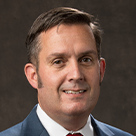The Power Of Collaboration & Strategic Partnerships In Today’s Evolving Market: The UPMC Approach
In this keynote session, Dr. Matthew Hurford, President and CEO of Community Care Behavioral Health and Vice President of Behavioral Health at UPMC Insurance Services, will explore how strategic alliances and integrated care models are transforming health care delivery. He will highlight how UPMC and Community Care are advancing health equity and quality through their innovative Quality Improvement Program, which fosters close collaboration among providers, members, and stakeholders. Gain valuable insights into how UPMC’s unique partnerships are reshaping the future of behavioral health, driving better outcomes, and expanding opportunities for patient-centered care.

Matthew O. Hurford, M.D.

Dr. Hurford is the President and Chief Executive Officer (CEO) of Community Care Behavioral Health Organization, the nation’s largest not-for-profit behavioral health managed care organization. As part of the UPMC Insurance Services Division, Community Care provides behavioral health coverage for one million Medicaid beneficiaries in 41 Pennsylvania counties. Dr. Hurford has worked in public-sector psychiatry for nearly 20 years holding various leadership positions in academic, government and managed care systems including, most recently, serving as Community Care’s Chief Medical Officer and Vice President of Medical Affairs.
Prior to joining Community Care, Dr. Hurford served as the Chief Medical Officer of the City of Philadelphia’s Department of Behavioral Health and Intellectual Disability Services (DBHIDS) and Community Behavioral Health (CBH), a not-for-profit behavioral health managed care organization that managed approximately $850 million in Medicaid funding. He is a board-certified psychiatrist who has provided care to people with serious mental illness and substance-use disorder in diverse settings including the Indian Health Service on the White Mountain Apache Reservation in Arizona and urban community mental health centers in Philadelphia.
Bridging The Gap Between Data & Decisions With AI
Sponsored By: 
In today’s data-rich healthcare environment, the challenge isn’t gathering information—it’s transforming that data into actionable clinical decisions that improve client outcomes. Join Dr. Michael Arevalo, Director Of Clinical Strategy of Core Solutions, as he explores how AI is bridging this critical gap in care delivery processes.
Drawing from real-world implementations and Core Solutions’ breakthrough Cx360 Intelligence platform, Dr. Arevalo will demonstrate how intelligent EHR systems can convert complex client data into clear, actionable insights at the point of care. This session will examine practical applications including predictive analytics for early intervention, AI-driven care coordination across the continuum, and decision support tools that enhance clinical judgment without creating workflow disruption.
Attendees will learn how to:
- Apply predictive analytics for earlier, more effective interventions
- Improve care coordination with AI across the entire continuum of care
- Leverage decision support tools to strengthen clinical judgment without slowing workflows
- Seamlessly integrate AI solutions into existing EHR and care models
Michael Arevalo, Psy.D., PMP

Employee Engagement & Retention Starts With Leadership: The Jay Nolan Community Services Case Study
In this current chaotic business environment where providers struggle to recruit and hire top talent, employee engagement and retention are more critical than ever. The more an organization’s employees feel invested in, valued, listened to, and appreciated, the greater the buy-in, commitment, and longevity organizations see from their most valuable resource – their staff.
This is “mission critical” for leadership teams and not something that can be delegated to HR or committees as a project. When the senior leadership team of an organization takes accountability for creating an environment that people want to work in, not only will it relieve some pressure on recruiting, but the organization will also deliver higher quality services and perform better financially.
Hear from Jay Nolan Community Services, a provider for fifty years with over 700 staff and supporting over 550 individuals with autism and developmental disabilities, as they discuss their approach to making employee engagement and retention a core part of the organization’s culture and “DNA” (Develop, Nurture, Appreciate).
Edward R. Amey, MS

Throughout his career, Edward has worked with children, teens, individuals, and families from various walks of life; as a coach, crisis counselor, social worker, therapist, teacher, adoption services supervisor, and program director. He has been a member of several boards, as well as serving as the Executive Director of The Concordia Schools – Los Angeles, the Managing Director for The Institute for the Redesign of Learning, and now as the CEO of the Jay Nolan Family of Companies.
Edward has led multiple organizations to financial prosperity, through digital and cultural change, by focusing on the greatest assets they have, the people they support, and the people providing that support. He is committed to helping the leaders in our communities and companies to drive lasting positive change through innovation that keeps people at the center.
Having been in executive leadership roles for nonprofits for over 20 years; Edward believes one of the fundamental ways to strengthen our communities is through purposeful efforts to provide opportunities for every member to contribute. By providing safe, challenging, and diverse venues in which to grow, develop, and contribute we create communities that are whole and healthy.
From Burnout To Breakthrough: Using Tech & Ops To Build Resilient Teams
In today’s volatile workforce environment, technology alone won’t solve burnout, turnover, or staffing shortages. True agility comes from identifying the real constraints in your workforce lifecycle and simplifying operations before layering on new tools. In this session, former Aurora Mental Health and AWS leader, Isamu Pant, shares case studies showing how analytics, operational rhythms, and workflow redesign unlocked agility without expensive tech overhauls. Attendees will participate in a live diagnostic to pinpoint their organization’s biggest bottleneck and walk away with an Agility Scorecard and a 72-hour action plan to improve workforce resilience immediately.
Key Attendee Takeaways:
- Discover the top three bottlenecks that limit workforce agility: hiring, onboarding, and operations.
- Learn through case studies how organizations solved constraints without costly or disruptive tech overhauls.
- Leave with a live diagnostic, Agility Scorecard, and 72-hour action plan to reduce burnout and increase workforce resilience.
Isamu Pant

Isamu Pant believes that when we take care of people, performance follows. His career has been driven by a passion for simplifying complexity so teams can focus on impact, not firefighting. At Aurora Mental Health, he built the organization’s first analytics department, introduced agile operating practices across executive teams, and helped leaders align around five critical organizational priorities every quarter. This work reduced burnout, improved client access, and gave the organization a stronger foundation for growth.
At Amazon Web Services, Isamu designed and implemented a Product Development Playbook that streamlined innovation across teams, and was called on to judge and coach product teams developing cutting-edge solutions. He also scaled operational rhythms that freed leaders from day-to-day chaos and gave them the clarity to innovate.
Across healthcare and high tech, his approach is the same: identify the real constraint, simplify the process, and create systems that put people in the best position to succeed. Today, through his work with Designed for Time, he partners with mission-driven organizations to reduce burnout, strengthen outcomes, and align teams around what matters most.
Becoming Data-Driven: How Real-Time Business Intelligence Transformed CenterPointe’s Productivity & Culture
Sponsored By: 
Data-driven insights are foundational for informed decision-making, yet many behavioral health organizations are uncertain where to begin or how best to leverage data to meet mission-critical KPIs. With an uncertain market environment and challenges around burnout, staffing shortages, and retention, the ability to leverage real-time Business Intelligence (BI) can deliver greater operational oversight and empower your organization to do more with less.
Joined by Qualifacts’ Rich Rose, a Senior Business Intelligence Services Consultant, Dr. Ryan Carruthers, the Chief Clinical Officer at CenterPointe, will share his organization’s journey to become a data-driven organization.
Specifically, the presentation will:
- Outline CenterPointe’s struggles prior to adopting Business Intelligence (BI), including an inability to access real-time data and make it actionable.
- Detail the practical ways CenterPointe utilizes 1,000+ BI reports across the organization today, from frontline staff to individual teams and executive leadership.
- Review CenterPointe’s positive outcomes since adopting BI, including improvements in fiscal forecasting, increases in fundraising, and unparalleled staff productivity through automated workflows.
- Discuss strategies for other organizations looking to leverage real-time data for informed decision-making.

Ryan Carruthers, Ph.D., LMHP, LADC, CPSS

Ryan Carruthers is a Licensed Mental Health Practitioner (LMHP), Licensed Alcohol and Drug Counselor (LADC) and Certified Peer Support Specialist (CPSS) in the State of Nebraska who has been practicing for over 18 years. He holds a Ph.D. in Counseling Studies from Capella University.
Ryan is a member of the Motivational Interviewing Network of Trainers and has also worked as an adjunct professor at local colleges. Ryan has provided countless continuing education classes to other addiction counselors and mental health practitioners in the State of Nebraska on topics related to harm reduction, suicide prevention, and alternatives to the 12-step programs. He is also a Certified SMART Recovery facilitator, as he started Nebraska’s first SMART Recovery meeting. Ryan has created programs for Education Courses, Outpatient Programming, Intensive Outpatient Programming, Adolescent/Family Education Courses, and Short-Term Residential programs.
At the end of the 2007-08 school year, Ryan was awarded Millard Public School’s “Expanding Horizons” Award for “Making a difference by enhancing students learning of curriculum through practical experience in the school environment.” Ryan has held various positions with CenterPointe, in Omaha and Lincoln, Nebraska, and has been their Chief Clinical Officer for the last three years.
Rich Rose

For more than seven years, Rich Rose has been the Senior Business Intelligence Consultant for Qualifacts where he provides in-depth support and agency-specific consultation for agencies contracted for the Credible Business Intelligence (BI) solution. He began his Qualifacts career as a member of the service team where he resolved over 4,000 support cases, acquiring subject-matter expert status in business intelligence, ad hoc reporting, and data systems on the Credible platform.
Prior to joining Qualifacts, Rich was the Quality Improvement and Compliance Director for a Credible partner agency, giving him a deep understanding of the Credible platform. He has a bachelor’s degree in business leadership and a master’s degree in business administration. Being based in Southern Oregon, in his off time, Rich and his wife, Kiki enjoy hiking, rafting, fishing, and playing with their three dogs!
Building An Agile Team For Hybrid Workforces
The shift to hybrid work models is transforming the health care workforce — but success requires more than just flexible schedules. It demands agile teams built for adaptability, collaboration, and resilience. This session will guide executives through strategies to design and support high-performing hybrid teams that can thrive across clinical, administrative, and remote environments. Learn how to foster a culture of agility, leverage digital collaboration tools, redefine team roles, and implement management practices that support both in-person and virtual staff. Gain insights into real-world examples from organizations leading the way in hybrid workforce innovation, and walk away with practical approaches to drive engagement, accountability, and operational excellence.
This session will help attendees answer:
- How do you lead when your staff is scattered?
- What does ‘agility’ mean in a clinical setting?
- How do you onboard, supervise, and build team identity across remote and onsite roles?
Eric Eberman, M.S.Ed.

Eric Eberman, M.S.Ed., is an experienced leader in New Jersey’s behavioral health and disability services sector. Since January 2023, he has served as Executive Director of Devereux Advanced Behavioral Health – New Jersey, overseeing programs that support nearly 400 adolescents and adults with behavioral, emotional, and cognitive disabilities, including autism.
Since joining Devereux, Eberman has focused his efforts on developing a high-performing leadership team and finding sustainable growth opportunities for the future of the organization.Prior to this role, Eberman was the Director of Public Policy at Autism New Jersey, where he championed legislative initiatives and systemic reforms to enhance services for individuals with autism and their families. Before that, Eberman worked for 17 years at Bancroft where he started as a direct support professional and held roles of increasing responsibility, including senior director of strategic planning, executive director of pediatric and adolescent residential programs, vice president of acute behavioral health, and vice president of clinical services.
Eberman earned his Master of Science in Education, specializing in applied behavior analysis, from Temple University, and a Bachelor of Arts in Psychology from Rider University. During his 28 years in the field, Eberman has served on a number of Boards and has received numerous honors for his work. He received the Philadelphia 76ers’ “Heroes Among Us” award, which is given to individuals in the greater Philadelphia area who have made exceptional and overwhelming contributions to better the lives of children in the community. He also was named one of South Jersey Magazine’s “Men of the Year,” which recognizes men who demonstrate a spirit of caring, giving and making a difference in the lives of others.
Strengthen Your Foundation: The Legal Structures & Compliance Tactics You Need To Support Partnerships & Affiliations At Scale
This workshop features two distinguished legal experts who will highlight approaches to growth and sustainability for organizations operating in the health and human services sector and discuss the danger zones presented by the changing economic, policy, and regulatory landscape of the industry. Through exploring the plans and options for growth developed and used within the Woods System of Care, this interactive, three-hour executive seminar is designed to equip behavioral health leaders with a deeper understanding of growth strategy and the array of options available to reduce risk while gaining scale. The session will highlight potential dangers and opportunities you will face on that path.
The Workshop will be a blend of content presentation and open discussions that will address the specific issues, risks, and opportunities for growth today. The workshop will include discussions about:
- The importance of strategic planning and the questions that were considered and addressed in the development of Woods System of Care – cohesion, alignment, and growth
- Deploying legal structures for cohesion, alignment, and growth, including not only various forms of corporate structures and alliances but also affiliations such as joint ventures and tactical partnerships.
- Assessing the potential value and risk of affiliations and customizing approaches to ensure the best outcome.
This workshop is specifically focused on CEOs, CFOs, and key leaders who could be involved in an alliance or affiliation opportunity.

Simon Kimmelman

Simon Kimmelman, Esq., serves as Senior Executive Vice President and Chief Operating and Legal Officer for the Woods System of Care. In his role as Chief Legal Officer, he heads up the Woods Legal Department and oversees all law-related matters for Woods, its affiliates, and related entities. As Chief Operating Officer, he is directly responsible for implementing the Woods Strategic Directions Plan and coordinating the Woods System of Care operations. Previously, he was a member of Sills Cummis & Gross P.C. and served as Managing Partner of the Firm’s Princeton, New Jersey office. Mr. Kimmelman’s practice was focused on business bankruptcy, health law, general corporate matters, and commercial litigation. He has represented major entities involved in many of the most significant Chapter 11 cases filed in New Jersey and several other jurisdictions. He served as the bankruptcy trustee for Kiwi International Airlines and John Z. DeLorean. He is admitted to the Bar in Pennsylvania and New Jersey. He is a fellow of the American College of Bankruptcy and former Chair of the Bankruptcy Law Section of the New Jersey State Bar Association and the Lawyers’ Advisory Committee to the New Jersey Bankruptcy Court. In recognition of his contributions to the advancement of medicine and dental medicine, he has recently been elected a Fellow of the College of Physicians of Philadelphia. Mr. Kimmelman has been involved in various charitable endeavors and most recently served as President of Har Sinai Temple in Pennington, New Jersey. He also served as a long-standing Member and Board Chair of the Woods Resources Board of Trustees. Mr. Kimmelman received his B.A. from the University of Pennsylvania and his law degree from Vanderbilt University Law School.

Ray Wolfe, J.D.

Raymond “Ray” Wolfe, J.D. brings over 40 years of experience in the health and human services sector to the OPEN MINDS team. His areas of expertise include managed care and value-based reimbursement models, financial analysis and management, mergers and acquisitions, CCBHC certification, integrated care, performance improvement, and strategic planning.
Before joining OPEN MINDS, Mr. Wolfe served in a 22-year tenure with Pittsburgh Mercy Health System in Pittsburgh, Pennsylvania. Most recently, Mr. Wolfe served as the organization’s Chief Operating Officer (COO), where he was responsible for oversight of all system operations, strategic planning, and performance management. Under his direction, Pittsburgh Mercy achieved Certified Behavioral Health Center status, earned over $850K in value-based reimbursement contract quality bonus awards, integrated three organizations through merger/acquisition, opened a primary care service that was integrated into programming for the severe and persistent mentally ill and homeless populations, and adopted a new performance management program for managers.
Before acting as Pittsburgh Mercy’s COO, Mr. Wolfe served as the organization’s Chief Financial Officer (CFO) and was responsible for the development of internal costing methodologies, contract rate negotiations, and financial forecasting activities. In addition, he coordinated an integrated care program with local partner hospitals to develop a series of diversion and respite programs, as well as specialized primary care, integrated care management, and high utilizer teams, while maintaining 15 consecutive years of profitability. Mr. Wolfe supervised the opening of a primary care clinic and Pittsburgh Mercy was selected in the first round for CCBHC status.
Mr. Wolfe was promoted to CFO after serving as the Director of Fiscal and Information Security/Compliance for the health system. In this role, he was responsible for managing the transition of service contracts from fee-for-service (FFS), leading all compliance activities, and implementing a next-generation electronic health record (EHR) system.
Prior to his time at Pittsburgh Mercy Health System, Mr. Wolfe served as Chief Fiscal Officer with the Summit Center for Human Development in Clarksburg, West Virginia, where he was responsible for reporting and budgeting functions and preparing Summit Center’s programs for FFS billing.
Previously, Mr. Wolfe served in billing and collections for two Pennsylvania-based hospitals. First, in his role as a manager for Healthcare Corporation of America (HCA) and as an Accounts Receivables Manager for Brownsville General Hospital in Brownsville, Pennsylvania, where he managed the accounting and billing system transition systems. Later as a Patient Account Manager for St. Francis Medical Center in Pittsburgh, he improved collections to hit a 95% rate through the implementation of new billing software and department reorganization.
Prior to working in the health and human services market, Mr. Wolfe spent five years practicing as an Attorney with the Law Offices of Arch A. Moore in Moundsville, WV. In this role, he provided general legal practice, created and established bylaws for multiple corporations, and handled West Virginia licensing of first vision insurance plan.
Mr. Wolfe earned his Juris Doctor from the West Virginia University School of Law in Morgantown, WV, and his Bachelor’s degree with a focus in Political Science and Sociology from West Liberty University, Wheeling, West Virginia, where he graduated Magna Cum Laude.
The CEO Succession Planning Panel: Industry Insights
In an era of accelerating change and increasing leadership turnover, health care organizations must be more intentional than ever about CEO succession planning. This expert panel brings together seasoned executives, all current or former CEOs, to share candid insights and proven strategies for navigating the complexities of CEO transition. From identifying and developing internal talent to managing unexpected departures and aligning with board expectations, this session will provide actionable guidance grounded in real-world experience. Whether your organization is preparing for a near-term transition or building a long-term leadership pipeline, join us for this conversation designed to equip CEOs and senior executives with the tools to ensure leadership continuity and organizational resilience.
James H. Stewart

James (Jamie) was appointed CEO in June 2016. He joined Grafton in August 2008 as Chief Administrative Officer and Executive Vice-President. As a successful financial and administrative leader he has over twenty years’ progressive experience in a healthcare environment.

Rochelle Head-Dunham, M.D., DFAPA, FASAM

Dr. Head-Dunham’s academic and administrative leadership has fostered noteworthy advances in the fields of addiction and mental health. She has served as a subject matter expert on various national and state platforms informing best practices for the field of behavioral health. Her clinical accolades include Clinical Faculty of the Year for the 2021 academic year at LSU School of Medicine. In 2019 she was the recipient of the Nyswander/Dole Award from the American Association for the Treatment of Opioid Dependence, INC. (AATOD). Her clinical acumen coupled with her transformative leadership style has shaped an administrative career that fosters enduring changes for systems, organizations and individual levels of performance. Dr. Rochelle Head-Dunham is a New Orleans native who currently serves as the Executive Director and Medical Director for Metropolitan Human Services District (MHSD), a state local governing entity tasked with service delivery for indigent and Medicaid ensured persons living with mental illness, substance use disorders and intellectual/developmental disabilities, residing in New Orleans and neighboring parishes.

Karen Carloni, NCC, LCPC, CRC

Karen Carloni is the Director of Boundless Advantage, the strategic resources division of “Boundless Strategic Resources, Inc”. Boundless Advantage focuses on the development of strategic partnerships. Her role is to develop culturally successful, smooth integrations. Karen’s former roles include CEO of Southern Maryland Community Network, COO of Cornerstone Montgomery and VP of Market Intelligence at Open Minds. She has also served in clinical and social services roles during her career. At Boundless Advantage she combines her over 30 years of diverse experience in health and human services with a strong focus on developing sustainable organizations.
Leading The Change: Insights From Payers On Serving High-Needs Consumers While Staying Resilient
With changes in federal policy, new care delivery models and the integration of advanced technology driving transformation across the field, the behavioral health industry is evolving at a rapid pace. At the same time, providers must stay focused on addressing the challenges and complexities of serving the most high-needs consumers. This panel of interdisciplinary leaders and payers will share their perspectives on how the latest industry shifts are transforming the payer mix and reshaping access to care. Panelists will explore strategies for strengthening payer-provider collaboration and using these opportunities to build resilience in an uncertain marketplace.
Designed for health care executives and provider organizations, this session offers a rare opportunity to hear directly from decision-makers who are leading in the face of inevitable change at the center of behavioral health.
Bruce A. Eddy, Ph.D.

Bruce Eddy is executive director of the Community Mental Health Fund (CMHF). The Fund is a public payer for mental health services for 18,000 uninsured residents of Jackson County, Missouri. Direct services are provided through 35 contracting non-profit agencies. Bruce’s responsibilities include the development and oversight of healthcare contracts, strategic direction, government relations, budgeting, quality assurance programs, and staffing an appointed board of trustees. He also represents public services as a Kansas City Tax Increment Finance Commissioner. In his prior role, he served as executive director of Resource Development Institute, a non-profit research and evaluation institute. He received his doctorate in community psychology from the University of Missouri-Kansas City. In his post-doctoral work, he directed national and international technical assistance at the Association of University Affiliated Programs for Developmental Disabilities in Washington, DC.
Maureen Tarpinian, MBA

Maureen Tarpinian, MBA is the Chief Operating Officer of Carelon Behavioral Health, where she leads national operating strategy and performance across a broad portfolio of functions. With more than 20 years of healthcare leadership experience, she has driven major operational turnarounds, launched new service centers, and advanced the strategic use of automation and AI to improve efficiency and quality of care. Known for her expertise in strategic planning, change management, and building high-performing teams, Maureen also serves as a mentor to emerging leaders. In 2025, Becker’s Hospital Review named her to its list of the Top 100 Women to Know in Health IT.
The LifeSkills Approach To Government Relations
As the landscape of behavioral health service delivery continues to evolve, we must recognize the critical role of government and legislative bodies in shaping the future of care. Hear from LifeSkills, a non-profit corporation located in Kentucky that provides mental health, addiction and I/DD services, on how they created a new role focused on government relations. Attendees will gain a better understanding of how legislative action, funding, and policy reforms are pivotal in driving systemic change to meet the growing needs of individuals and communities, and what they can do to get involved when critical decisions are made.
Join this session to learn the important lessons of not only what to do, but also what not to do, when advocating with policymakers.
Joe Dan Beavers, CPA, MHA

Joe Dan Beavers is the President/CEO of LifeSkills, Inc. a community mental health center based in Bowling Green, Kentucky. With over 25 years in healthcare, his work focuses on expanding access to mental health, addiction treatment, and developmental disability services in rural communities.
LifeSkills was founded in 1966 and serves over 26,000 individuals each year through mental health, substance use disorder and intellectual and developmental disabilities programs. In January of 2020 LifeSkills and the Pennyroyal Center merged, creating one of Kentucky’s largest community mental health centers.
Later that year, LifeSkills also helped lead the formation of the Community Health Network of Kentucky (CHN). CHN includes LifeSkills, Pennyroyal Center and three additional community mental health centers in Kentucky. Together CHN supports over 64,000 individuals annually through 55 programs across rural Kentucky.
Joe Dan has a BS in Accounting from Western Kentucky University, a Master’s degree in Healthcare Administration from the University of Kentucky and is a Certified Public Accountant.
Whitney H. Westerfield

Whitney Westerfield serves as the Director of Legal and Governmental Affairs for LifeSkills, Inc., one of Kentucky’s largest behavioral health providers covering 18 counties across South Central and Western Kentucky. Prior to joining LifeSkills, Whitney represented the 3rd Kentucky Senate District from 2013 through 2024, and served as chair of the Senate Judiciary Committee for all three terms in office. Senator Westerfield also served as a member of the Senate Standing Committees on Agriculture, Families and Children, Natural Resources and Energy, the Veterans, Military Affairs, and Public Protection Committee, and the Juvenile Justice Oversight Council. Additionally, he helped create and was an inaugural a member of the Commission on Race and Access to Opportunity. His award winning legislative record includes Kentucky’s most comprehensive overhaul to its juvenile justice system in decades, amending Kentucky’s Constitution to include rights for crime victims, and a pilot program funded with opioid settlement funds to intervene in criminal cases shortly after booking to pair offenders with behavioral health services.
Following his legislative service Westerfield continues to work with national advocacy organizations to advance the cause of data-informed criminal justice and behavioral health policy. You can occasionally find his writing in the editorial pages of the Louisville Courier-Journal.
Senator Westerfield received his B.S. in Communication at the University of Kentucky in 2003, and his J.D. in the spring of 2006 from Southern Illinois University School of Law. He has been an active member of the Kentucky Bar since October 2006 and the Tennessee Bar since 2012. He owns a small row crop farm in Western Kentucky with his five brothers. Whitney and his wife, Amanda, have five children, including a set of triplets, and live in Western Kentucky.
Systems Upgrades: A Functional Checklist For Buying The Right Systems For Your Organization

From addressing needs to effectively manage today’s diverse service lines, to demands from payers and regulators regarding reporting and integration, selecting the best system platforms to drive organizational efficiency is a priority for every CFO. This case study presentation will explore how an organization has successfully navigated the process of choosing systems that meet today’s needs while positioning the organization for continued success. Through real-world examples, attendees will be guided through a functional checklist that helped this organization successfully navigate the process of choosing the system. Attendees will gain valuable insights into the key factors to consider when purchasing new systems, including scalability, integration, compliance, and functionality.
Key Takeaways:
- A functional checklist to help evaluate critical system features and capabilities
- Practical tips for assessing integration and scalability to ensure long-term success
Jeff Arledge

Strategic finance and operational executive with a passion for continuous improvement, empowering highly functional teams, and leading transformational change. Proven success engineering the financial turnaround of businesses while driving cultural change toward an accountable, metrics driven environment, to ensure sustainability. Throughout his career he spearheaded several multi-million dollar technology infrastructure implementation projects that provided cost improvements, operational efficiencies and enhanced bottom line profitability.
His professional career spans both healthcare and the financial services industry, with additional strengths in strategic planning, financial planning & analysis, process improvement, operations, and information technology. His professional credentials include the Chartered Financial Analyst® designation and the Certified Healthcare Financial Professional certification from the Healthcare Financial Management Association.
Currently, as Executive Vice President and Chief Financial Officer for Easterseals Midwest, Jeff leads the strategic initiatives for the organization as well as finance, accounting, revenue cycle, information technology, risk management, compliance, contracting/legal, fleet management, and facilities management. Since joining ESMW in April of 2018, Jeff has led the transformational turnaround of the organization into a financially sustainable agency well positioned for future growth. A few of the current strategic initiatives include workforce management, new technology enabled supports delivery models, and various productivity enhancement initiatives.
Strategies For Strengthening & Diversifying Revenue Sources: The Monarch Case Study
As financial pressures continue to mount across the health care landscape, leading organizations must think beyond traditional funding models to remain competitive and sustainable. This executive-level session will explore proven strategies for strengthening and diversifying revenue streams through deliberate, mission-aligned expansion and service integration.
Hear from Monarch, a nonprofit behavioral health and intellectual and developmental disabilities provider serving 27,000 people in North Carolina and Rhode Island, and a team of nearly 1,600 staff members, as they discuss insights into expanding services across state lines to unlock markets and scale operations. They’ll also discuss the financial and operational benefits of building integrated provider networks.
During this session, attendees will:
- Discover practical guidance for organizations looking to evolve their business models while staying grounded in quality and whole-person care
- Explore how the addition of care coordination services and integration of primary and behavioral health or I/DD services can drive both improved outcomes and new revenue opportunities
- Identify key strategies for expanding services into new state markets while maintaining regulatory compliance and service quality
Blake Martin, MHA

Blake Martin, MHA, serves as Monarch’s President. Under the direction of Chief Executive Officer Dr. Peggy Terhune, Blake leads the organization’s strategic planning efforts, build and maintain relationships with state and national policymakers and oversee operations of key business units, enabling the company to continue as well as expand the delivery of exceptional care across all services.
As President, Blake is directly responsible for identifying and developing strategic opportunities and maintaining relationships with the North Carolina Department of Health and Human Services, statewide local management entities and managed care organizations (LME/MCOs), social services agencies, licensing agencies and the people and families Monarch supports, among other key stakeholders.
Blake brings extensive experience in health care administration, operational oversight and fiscal management, having most recently served as Monarch’s Chief Strategy Officer, where he led the development and implementation of a new five-year strategic plan. He holds both a Master of Health Administration (MHA) degree and a bachelor’s degree from Pfeiffer University. He also serves as a member of Pfeiffer University’s Board of Trustees.
Lead Like It’s 1863: Timeless Lessons For Navigating Through Uncertainty
In an era of unprecedented complexity, timeless leadership lessons are more relevant than ever. Join Monica Oss, Chief Executive Officer of OPEN MINDS, as she explores the leadership decisions that shaped American history—and how today’s executives can apply those insights to navigate uncertainty, build trust, and make bold decisions when the stakes are high.
Monica E. Oss

Monica E. Oss, M.S. is the founder of OPEN MINDS and serves as its chief executive officer, executive editor of its publications and websites, and executive lead of its consulting engagements. For the past three decades, Ms. Oss has led the OPEN MINDS team and its research on health and human service market trends and its national consulting practice. She is well known for her numerous books and articles focused on the strategic and marketing implications of the evolving health and human service field – and its focus on the verticals of the field serving consumers with chronic conditions and complex support needs.
Ms. Oss has extensive experience in developing and implementing growth strategies for a wide array of organizations in the field. She has expertise in industry trend analysis, reimbursement and rate setting, and creating actionable plans for market success. In her role, she has led numerous engagements with state Medicaid plans, county governments, private insurers, and health plans, service provider organizations, technology vendors, neurotechnology and pharmaceutical organizations, and investment banking firms – with a focus on the implications of financing changes on delivery system design.
Prior to founding OPEN MINDS, Ms. Oss served as an executive with a nationally managed behavioral health organization, responsible for market development, actuarial analysis, and capitation-based rate setting. She also held a position as vice president of the U.S. risk management and underwriting division of an international insurance company.
Ms. Oss has been the keynote speaker at the conferences of dozens of national associations and has been published in a wide range of professional journals and trade publications. She has provided Congressional and state legislative testimony on issues as diverse as the financial impact of parity and payer medication access policies.
Ms. Oss has led a range of industry research and consultation initiatives, serving as principal investigator on research projects that include the examination of national managed care enrollment and service patterns, development of provider rate structures for government entities, creation of return-on-investment models for technology investments; design of performance-based compensation models within public and private health plans; and analysis of the economic impact of changes in benefit design, adoption of evidence-based practices, and new technologies.

